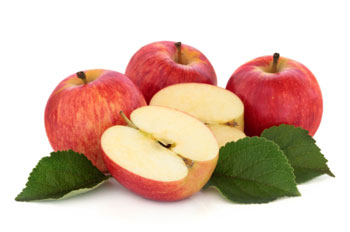Apples: Health benefits, facts, research

Possible health benefits of apples
A collection of research studies suggests that apples may well be one of the most healthy foods for you to include in your daily diet. Let's take a look at the studies and the possible health benefits suggested by them:
Nutritional profile of apples
Apples
Apples contain almost no fat, sodium or cholesterol.
Apples deserve to be called "nutritional powerhouses". They contain the following important nutrients:
Vitamin C - a powerful natural antioxidant capable of blocking some of the damage caused by free radicals, as well as boosting the body's resistance against infectious agents, according to the University of Maryland Medical Center.1
B-complex vitamins (riboflavin, thiamin, and vitamin B-6) - these vitamins are key in maintaining red blood cells and the nervous system in good health.
Dietary fiber - the British National Health Service2 says that a diet high in fiber can help prevent the development of certain diseases and may help prevent the amount of bad cholesterol in your blood from rising.
Phytonutrients - apples are rich in polyphenolic compounds". These phytonutrients help protect the body from the detrimental effects of free radicals.3
Minerals such as calcium, potassium, and phosphorus.
Apples, with skin (edible parts) nutritional value per 100 grams
Energy - 52 kcal Carbohydrates - 13.81 g
Fat - 0.17 g Protein - 0.26 g
Water - 85.56 g Sodium - 1 mg
Beta-carotene - 27 μg Lutein and zeaxanthin - 29 μg
Thiamin (vitamin B1) - 0.017 mg Vitamin A equiv - 3 μg
Riboflavin (vitamin B2) - 0.026 mg Niacin (vitamin B3) - 0.091 mg
Pantothenic acid (vitamin B5) - 0.061 mg Vitamin B6 - 0.041 mg
Folate (vitamin B9) - 3 μg Vitamin C - 4.6 mg
Vitamin E - 0.18 mg Vitamin K - 2.2 μg
Calcium - 6 mg Iron - 0.12 mg
Magnesium - 5 mg Manganese - 0.035 mg
Phosphorus - 11 mg Potassium - 107 mg
Note: the average size of an apple is 150 grams
Source: USDA
Risks and precautions
No serious side effects are linked to apple consumption.
Apple seeds contain contain cyanide, a powerful poison. Eating too many apple seeds can potentially be fatal. Apple seeds should not be consumed.
In addition, because apples are fairly acidic, they could be up to four times more damaging to teeth than carbonated drinks, according to a study led by Professor David Bartlett at the King's Dental Institute.5
Professor Bartlett said that "snacking on acidic foods throughout the day is the most damaging, whilst eating them at meal times is much safer. It's not what you eat it's how you eat it - an apple a day is good, but taking all day to eat the apple can damage teeth."
Apples - three frequently asked questions
Should I eat the apple peel? - Most of the fiber and antioxidants are in the peel, says Dianne Hyson, Ph.D., R.D.6, a research dietitian at UC Davis in the Department of Internal Medicine.
What about pesticides on the peel? - Dr. Hyson says "Despite public misperceptions, laboratories have consistently found very low levels - if any - of pesticide residues on the skin of apples."
I have type 2 diabetes, can I eat apples? - According to the American Diabetes Association, "Apples are a nutritious food and you can still eat them even if you have diabetes." The Association reminds people to eat the peel and advises on buying small apples (2.5 inches in diameter).